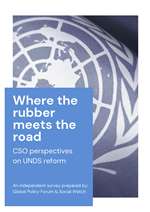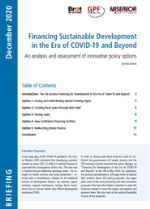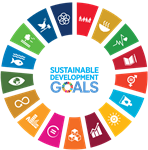Social Watch news
Published on Thu, 2021-03-18 11:02
The promise of the SDGs makes governments accountable but who is to be made responsible for global issues like the climate, the pandemic or finances? Join us to discuss this issue in a workshop hosted by Global Policy Forum, Global Policy Watch and Social Watch as part of the 2021 SDG Global Festival of Action. The workshop will be held on March 25, 2021 from 04:30 to 05:30 PM (CET). |
Published on Fri, 2021-02-19 14:13
The demands and urgency of addressing COVID-19 related issues have been added to the already crowded United Nations agenda, with consideration and intensity shifting up and down on the scale of priorities. |
Published on Thu, 2021-02-18 22:20
The United Nations and Member States begin the 2021 calendar confronted with the need to address the ongoing COVID-19 crisis and growing global inequalities. Despite the WHO’s efforts to make the COVID-19 vaccine “affordable and accessible for all” through the ACT Accelerator and calls by CSOs and UN leadership and world leaders for a People’s Vaccine (a global public good free from Intellectual Property Rights), the global vaccine distribution/rollout has been dominated by wealthy, developed countries, with little if any vaccines available for small and medium developing countries. |
Published on Mon, 2021-02-01 14:24
A survey among CSOs in “programme countries” evidences a very high level of commitment to UN values and principles, much dissatisfaction with the actual operations at country level and articulation of areas for improvement. For a number of CSOs, the UN system is appreciated for its inspiration, legitimization and promotion of the values they stand for, but is also viewed as a competitor for funds and influence, often displacing the social sector instead of building it. And frequently it is seen as both at the same time. |
Published on Wed, 2020-12-09 13:35
An analysis and assessment of innovative policy options In the early days of the COVID-19 pandemic, the United Nations (UN) estimated that developing countries needed an extra US$ 2.5 trillion in external finance to cope with the consequences of the crisis. This vast sum is needed because additional spending needs – for example on health services and social protection – coincide with a simultaneous collapse of all traditional sources of development finance: tax revenue, export earnings, migrant remittances, foreign direct investment and, to a lesser extent, also official development assistance (ODA). In order to discuss how these finances could be mobilized, the governments of Canada, Jamaica and the UN Secretary-General launched the policy dialogue on “Financing for Development in the Era of COVID-19 and Beyond” at the UN in May 2020. |
Published on Thu, 2020-12-03 19:54
The General Assembly (GA) will host its 31st Special session in response to the coronavirus disease (COVID-19) pandemic on 3 and 4 December 2020. The UN Charter (Chapter IV, article 20) provides for the General Assembly to meet in special sessions which can be "convoked by the Secretary-General at the request of the Security Council or of a majority of the Members of the United Nations." UN special sessions are unusual, this will be 31st in the life of the UN and only the sixth since 2000. As the COVID-19 pandemic’s widespread effects range across development, peace, security, and socioeconomic affairs, there is no doubt about the special measures that the global community must address to confront the global pandemic. |
Published on Tue, 2020-11-17 00:00
This was the theme of today’s session of the 11th Regional Assembly of the Latin American Campaign for the Right to Education (CLADE), which is taking place from October 13 to November 26, this year. Carrying out a process leading to the Assembly, a series of seven virtual public meetings are being organized, in which the current regional and international situation of the human right to education is analyzed, contributing to the definition of political action strategies for CLADE’s network in the next two years. |
Published on Mon, 2020-11-16 16:56
Supported by a supermajority in parliament and three landslide elections, in 2010, 2014 and 2018 the government of the Fidesz party, led by Prime Minister Viktor Orbán has severely undermined the system of checks and balances, eliminated political and professional autonomy of most of the state institutions and allowed the capture of the state by influential groups – oligarchs and political players. In October 2019, after years of paralysis and disarray of the Hungarian opposition, they obtained a surprise victory at the municipal elections, announcing changes that are still too early to predict. |
Published on Mon, 2020-11-16 16:44
Nepal should recover from the human and economic devastation caused by COVID-19 by accelerating efforts to achieve SDGs. Nepal needs clamor for policy attention and scarce resources, there is great temptation during crisis to react only for the immediate term. That would be a big mistake: as every recent crisis has revealed, Nepal is extremely vulnerable to underlying threats that can quickly become existential for large sections of the population. |
|
Published on Mon, 2020-11-16 16:25
“We are only as safe as the most vulnerable among us” |
SUSCRIBE TO OUR NEWSLETTER









